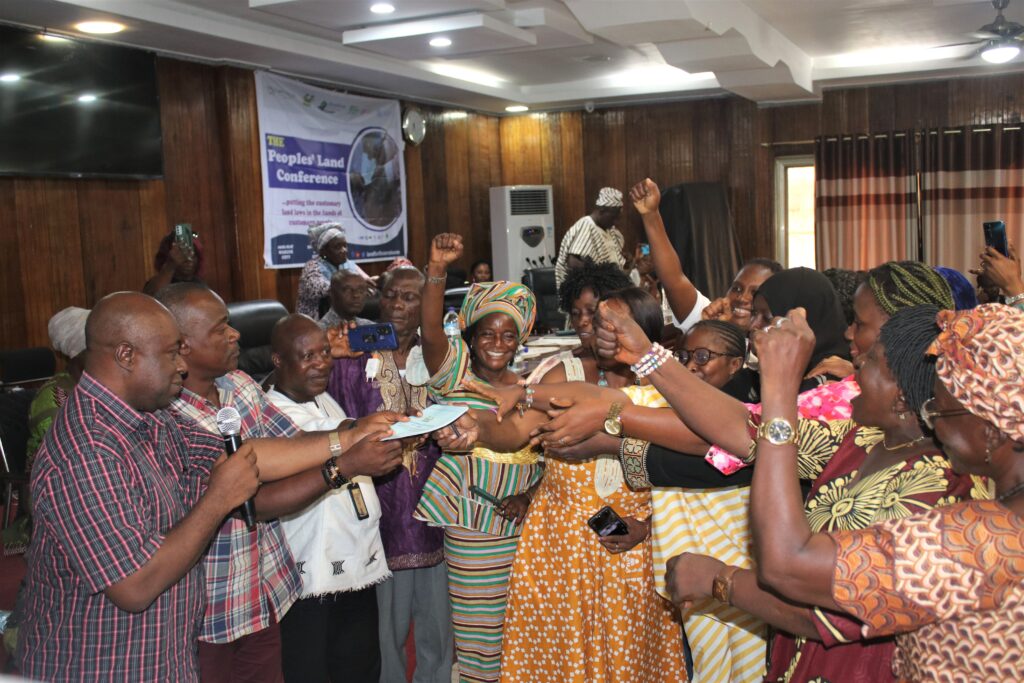
Who We Are
The Land for Life Initiative is a joint endeavour of civil society partners in four African countries (Burkina Faso, Ethiopia, Liberia, and Sierra Leone), supported by the German NGO Welthungerhilfe (WHH), the Civil Society Academy (CSA), and the German Ministry for Economic Cooperation and Development (BMZ).
The Initiative in Sierra Leone is an effort of four legally established national non-profit civil society organizations partnering as a consortium to roll out the initiative. The Network Movement for Justice and Development (NMJD) in the Kenema district serves as the consortium lead. The other three organizations are the United for the Protection of Human Rights (UPHR) in Porto-Loko district, the Partners Initiative for Conflict Transformation (PICOT) in the Pujehun district, and the Forum for Human rights and Development (FOHRD) in Tonkolili district. These organizations have interlacing mandates and a thematic focus which are contextually relevant to the campaign for responsible land governance reforms in the country. Especially the coordination organization – NMJD – but also the other three organizations have solid experience in contributing to policy reform and engaging communities on human rights issues. All organizations have specific expertise in land governance and people’s right to adequate food through responsible agricultural investments.
Our Strategy
We use the Multi-Actor Partnership (MAP) approach to promote inclusive, rights-based, and people centered land administration in Sierra Leone. We do this by promoting structures for open and inclusive dialogue.
The use the following strategies to drive home our objectives:
Strategy 1. Making existing multi-actor structures at the national level more participatory and inclusive;
Strategy 2. Strengthening the Consortium and other CSOs at the national level to play a meaningful role in the existing MAP;
Strategy 3. Build and strengthen multi-actor structures at the district level;
Strategy 4. Strengthen communities and support their socio-legal empowerment, so that they can act as meaningful players in the district level MAP.
Our Scope
We are currently active in four districts that are strategically located in the four regions of Sierra Leone. In Port-Loko, the North-Western Region, we are represented by United for the Protection of Human Rights (UPHR). Partners Initiative for Conflict Transformation (PICOT) have their headquarter in Bo city, and coordinate our steering engagements from there, but do have a field office in Pujehun and are actively engaging communities and decentralizing the MAP process in Pujehun district. Network Movement for Justice and Development (NMJD) is rolling out Land for Life engagement in Kenema while and Forum for Human rights and Development (FOHRD) a constituent organization of Sierra Leone Network on the Right to Food (SiLNoRF) in Tonkolili districts.
With the intention to expand on our member organizations, we will end up working in every district of Sierra Leone and in as many communities as we can afford to cover.
Partnership
We are in in both loose (informal) and well structured (formal) partnership with several organizations and entities.
Externally, we are known by or have some kind of relationship with the following organizations:
- German Welthungerhilfe, as the brainchild of the Land for Life Initiative, WHH is currently our sole funder and moral guarantor. From facilitating the establishment of the Land for Life Initiative to coordination and a continued technical backstopping support, international linkages, WHH is our intermediary between the German BMZ and us. Our internal control standards are prototypes of WHH as we remain accountable to our beneficiaries, the government of Sierra Leone and the WHH country office in Sierra Leone.
- The Civil Society Academy (CSA)– We have benefitted and continue to benefit a sustained technical support from CSA though the accompaniment of the Land for Life Initiative. CSA played a key role in the establishment of the Land for Life Initiative, supported setting up the structure, provide several technical and leadership trainings for the key actors and currently accompanying the OD process.
- The International Land Coalition (ILC) – We are not yet an official member of the ILC. However, we can say that we maintain a loose relationship with the global network of land governance actors. We have participated in several online events organizations by ILC, including the 2022 Global Land Forum in Jordan. We are also part of the land governance Momentum Group, the Land Collaborative and the VGGT +10 which are co-steered by ILC. Part of our sustainability plan is to apply for a full membership of the ILC once new membership window is opened.
- Food and Agricultural Organization (FAO) –the UN agency plays a critical role in Sierra Leone multi-actor Technical Working Group set up in 2014 for the implementation of VGGT. The mandate of the TWG has now been reviewed to steer an inclusive governance of land and other natural resources of Sierra Leone. FAO provided funding from the German government for the implementation of VGGT and RAI in Sierra Leone through the TWG which land for Life is a bona fide member.
- Land governance CSO Community of Sierra Leone –The first point of contact with other land governance CSOs in Sierra Leone is on the land governance Technical Working Group. The notable CSO organizations include Namati, Green Scenery, WONES, Transparency International, Solidaridad, Sierra Leone Land Alliance and NaCCLE. Beyond that, we may have met, partnered with or shared some level of relationship with other organizations including Invest Salone, CDHR, CARD-SL, MRD, Humanist Movement….
- Land Portal –As a global data hub on land, we have an account on the Land Portal webpage and have benefited from some levels of formal relationship with the team.
The Government of Sierra Leone – We are morally obliged to the people of Sierra Leone and legally regulated by the legislative framework of Sierra Leone government. We are therefore a member of the NGO community and a beneficiary of all government’s support to strengthening the civil society space. For instance, we have played an active role in the land governance reform as sitting member of the TWG on land.
